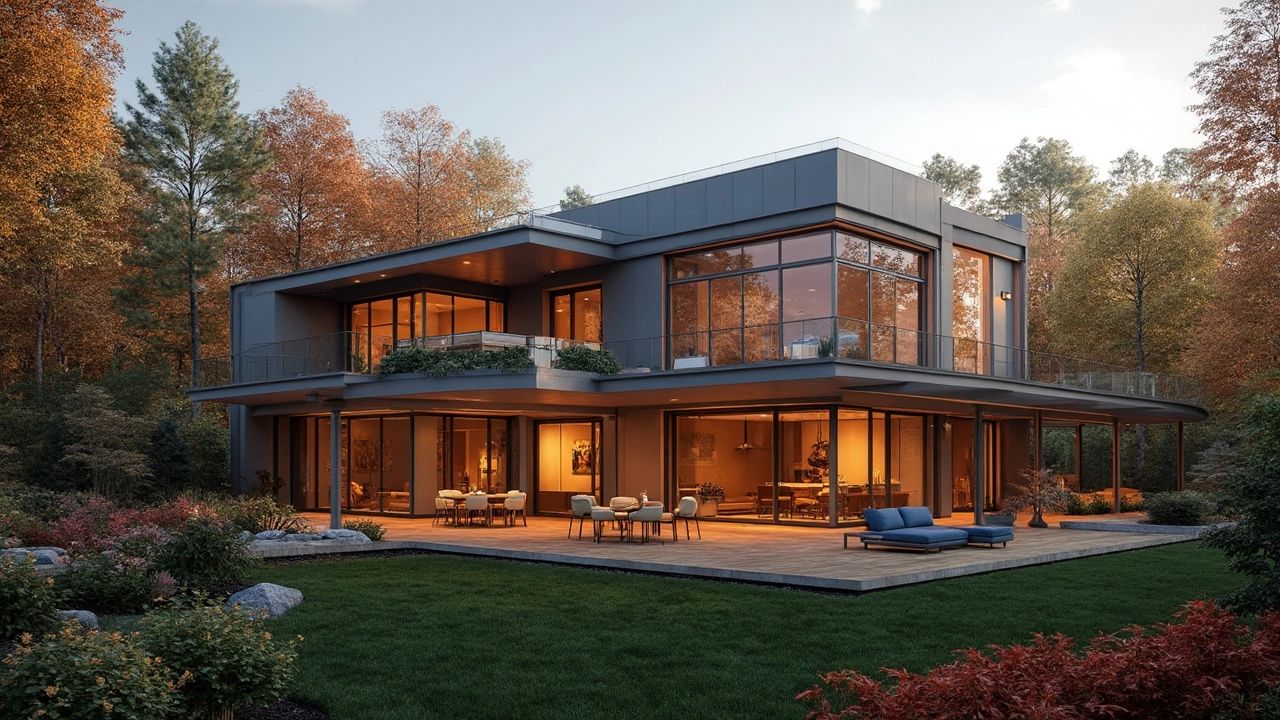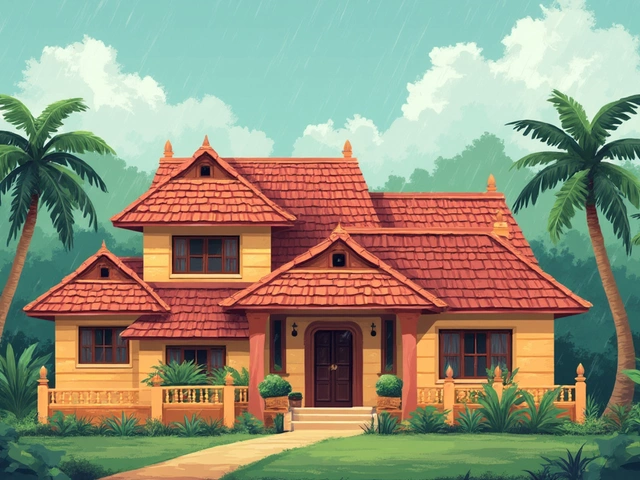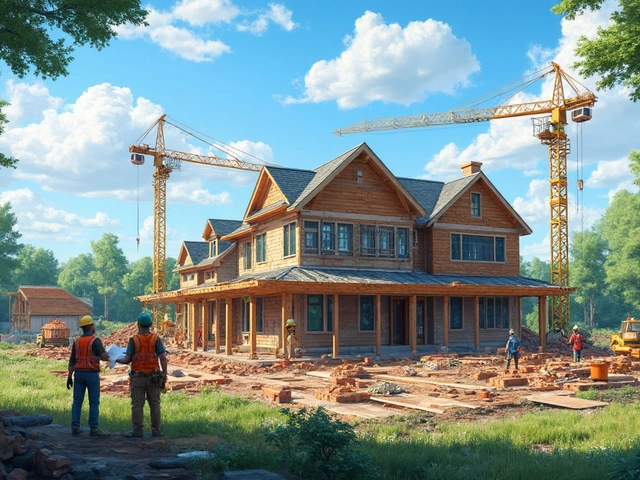Thinking about building a 2000 sq ft house in Massachusetts? Well, brace yourself, because costs can vary quite a bit! The journey to your dream home in this state starts with understanding the big expenses you'll likely encounter.
First off, the price of land is a huge chunk of the budget here. Urban areas like Boston will have higher land costs than more rural parts of Massachusetts. If saving on land is a priority, you might want to look a bit further away from the hustle and bustle.
Then, of course, you have construction expenses. This includes everything from foundation work to the final nail. On average, the cost per square foot can range anywhere from $150 to $300—depending on the quality of materials and complexity of the design you choose.
One fun fact: custom design features like fancy kitchens or additional bathrooms will obviously add to your costs. But, they're also great spots for future proofing if you ever decide to sell down the line.
- Understanding Land Costs
- Breakdown of Construction Expenses
- Impact of Design Choices
- Practical Budgeting Tips
Understanding Land Costs
Before you even start picturing your dream home, you need to get a handle on land costs. In Massachusetts, these costs can swing widely based on where you’re looking to build. It's no secret that Boston, being highly urbanized, will have more expensive land prices compared to rural areas. You’re easily looking at several hundred thousand dollars for plots in the city.
Why does it cost so much? Well, with Massachusetts being densely populated, especially around Boston, demand naturally drives up the prices. Smaller towns or suburbs might offer more affordable options, but keep in mind, the commute might be longer if you’re working in the city.
So, what should you consider when looking for land? Here’s a quick checklist:
- Zoning laws: These can affect what kind of house you can build and might limit certain structural features. Always check these with the town's planning office!
- Environmental factors: Does the land have marshy areas, or is it prone to flooding? You'll want to know about any potential issues that could rack up construction costs.
- Proximity to amenities: Schools, groceries, parks—being close to these is usually a plus for property value.
A cool study from 2023 showed that land purchases in Massachusetts made up about 35% of the total cost for new builds. So, be prepared to set aside a significant chunk of your budget just for the land.
Here's an interesting breakdown of average land costs per acre in some Massachusetts' areas:
| Location | Average Cost per Acre |
|---|---|
| Boston | $1,500,000 |
| Worcester | $95,000 |
| Plymouth | $120,000 |
| Springfield | $80,000 |
Remember, it's crucial to weigh your priorities and future needs when selecting land. It’s a big step, but understanding these factors will put you miles ahead in your house-building journey!
Breakdown of Construction Expenses
Building a 2000 sq ft house involves juggling a variety of costs, and it helps to know exactly where your money's going. Let's break it down so you can plan accordingly.
First up, the foundation and framing are the backbone of your project and usually take up a significant portion of the budget. Expect to allocate around 15-20% of your total construction cost here. It's the crucial first step—because who wants a house that doesn't stand straight?
Next on the list are the key systems: electrical, plumbing, and HVAC. These are your home's circulatory, nervous, and respiratory systems if you will. You can expect about 20-30% of your building expenses to go into this important trio.
Then, let's talk about your house's skin and bones—the walls, roof, and exterior finishes. Count on spending about another 20% of your total budget making these sturdy and weatherproof. In a state like Massachusetts where winters can be brutal, skimping here is not advisable.
Lastly, let's not forget the interior finishes. This is where your personal style shines through! From choosing tiles to picking out paint, everything adds up. On average, these choices will gobble up another 25-35% of your budget.
Just to give you a rough idea, here's a handy table showing typical cost ranges:
| Component | Cost Range (% of Total) |
|---|---|
| Foundation & Framing | 15-20% |
| Systems (Electrical/Plumbing/HVAC) | 20-30% |
| Exterior Finishes | 20% |
| Interior Finishes | 25-35% |
With these figures in mind, you'll have a clearer picture of how to manage your expenses effectively when building your dream house in Massachusetts. Remember, every choice you make impacts the final price, but getting these elements right will also impact your long-term satisfaction. So, while it's important to keep an eye on costs, it's also crucial to focus on quality where it matters most.

Impact of Design Choices
So, you've got the basic structure in mind, but how do design choices shake out in terms of costs when building that 2000 sq ft house? Well, this is where you can control just how extravagant the final price tag gets. Customizing your new build can significantly impact the overall costs.
The choice of materials is a major factor. Want those energy-efficient windows or marble countertops? Both are wise investments for the long term, potentially upping your home's resale value, but they'll also elevate your building expenses in the short term. Those top-tier options can set you back considerably more than standard choices.
Floor plans are another cost influencer. Open-concept designs are all the rage right now, but they often need more engineering savvy, which can boost construction costs. To add some hard numbers to it, adding a fancy cathedral ceiling can add $18,000 to $25,000, depending on the specifics.
| Design Feature | Additional Cost |
|---|---|
| High-end Kitchen | $20,000 - $50,000 |
| Extra Bathroom | $15,000 - $30,000 |
| Solar Panels | $10,000 - $20,000 |
Also, consider energy-efficient features, which are becoming increasingly popular. While they have an upfront cost, they save on utility bills over time. A home equipped with the latest smart technology isn't just convenient; it's also appealing to buyers, meaning more bang for your buck if you decide to sell.
Ultimately, think of design choices as investments rather than expenses. Prioritizing them can lead to a home that's not only beautiful and comfortable but also cost-effective in the long run.
Practical Budgeting Tips
When you're about to tackle building a new home, getting the budget right is crucial. No one wants to be caught off guard by surprise expenses, right? So, let's dive into some practical tips to keep your finances in check while building a 2000 sq ft house in Massachusetts.
Start by breaking down all potential costs. A detailed budget will guide you through the whole building process and safeguard you from unexpected spending. It’s a good idea to set aside about 10-15% of your total budget for contingencies. Why? Because, trust me, unexpected stuff happens.
Don't Skip the Quotes
Always get multiple quotes from contractors. This isn't just about finding the cheapest option but about comparing value. Look at their reviews, ask for references and see their previous work. A good contractor can often save you money through their expertise.
- Consider the cost of permits and local fees; in Massachusetts, they can vary significantly depending on the town.
- Factor in landscaping and outdoor features. These are often forgotten, but a beautiful garden or well-built driveway can add value to your property.
- Be strategic about your design. Open floor plans or simple rectangular shapes usually cost less to build.
Smart Material Choices
Materials greatly influence your budget. Go for quality within reason—it's better to invest a little more upfront on things like insulation to save on future heating bills in the chilly Massachusetts winters.
Remember, while fancy marble countertops or high-end fixtures are nice, they're often easy to upgrade later when your budget allows. Prioritize the bones of the house first.
Understanding Financing
A construction loan might be your best friend here. Unlike a traditional loan, they release money in stages as the construction progresses. It keeps contractors on schedule and ensures funds for each phase.
If you can, lock in interest rates early, especially in a fluctuating market. With interest rates having varied a lot over the past few years, this could mean big savings.
Building a house is exciting but having these budgeting tips in mind ensures your dream home doesn’t turn into a financial nightmare. So, plan wisely, and happy building!



Write a comment